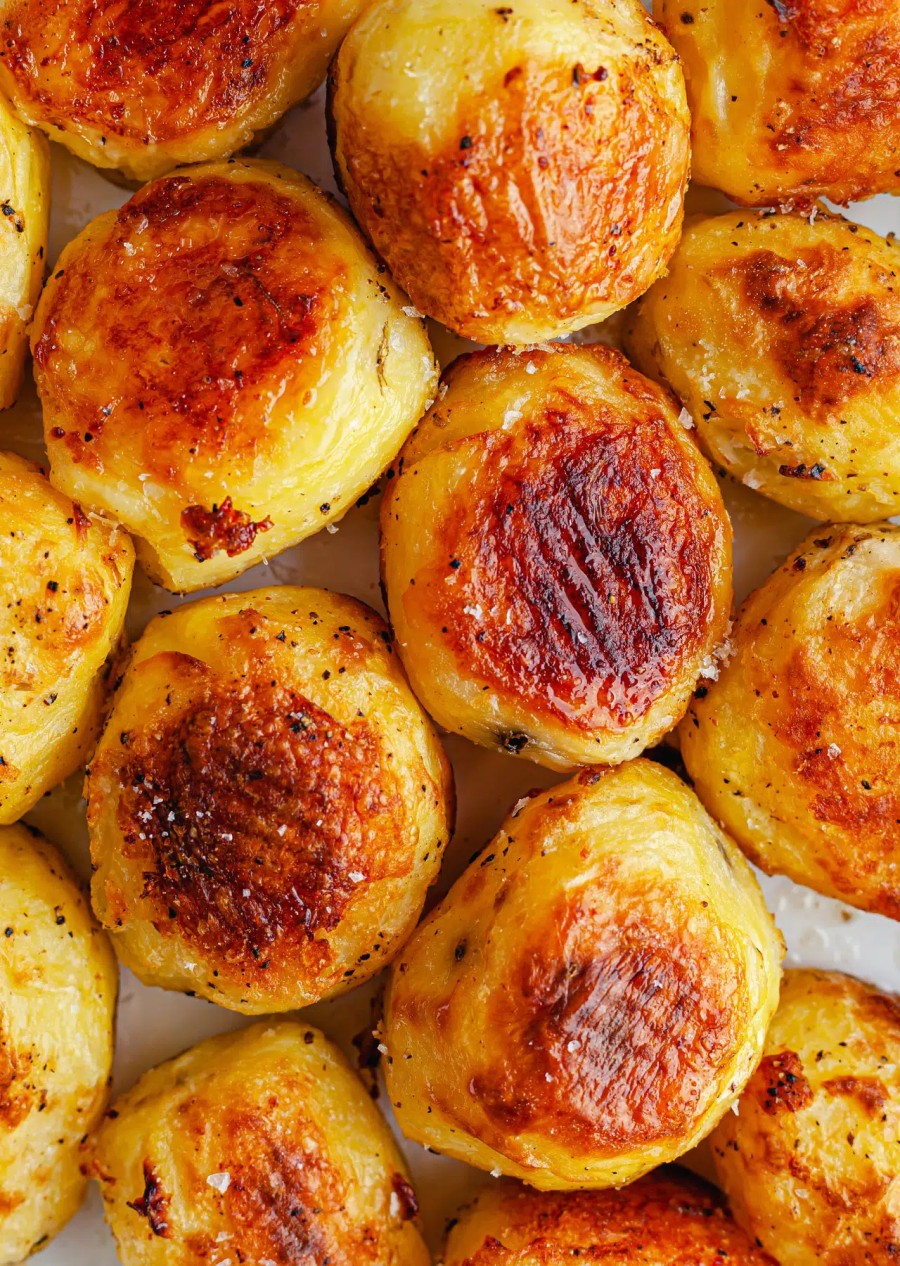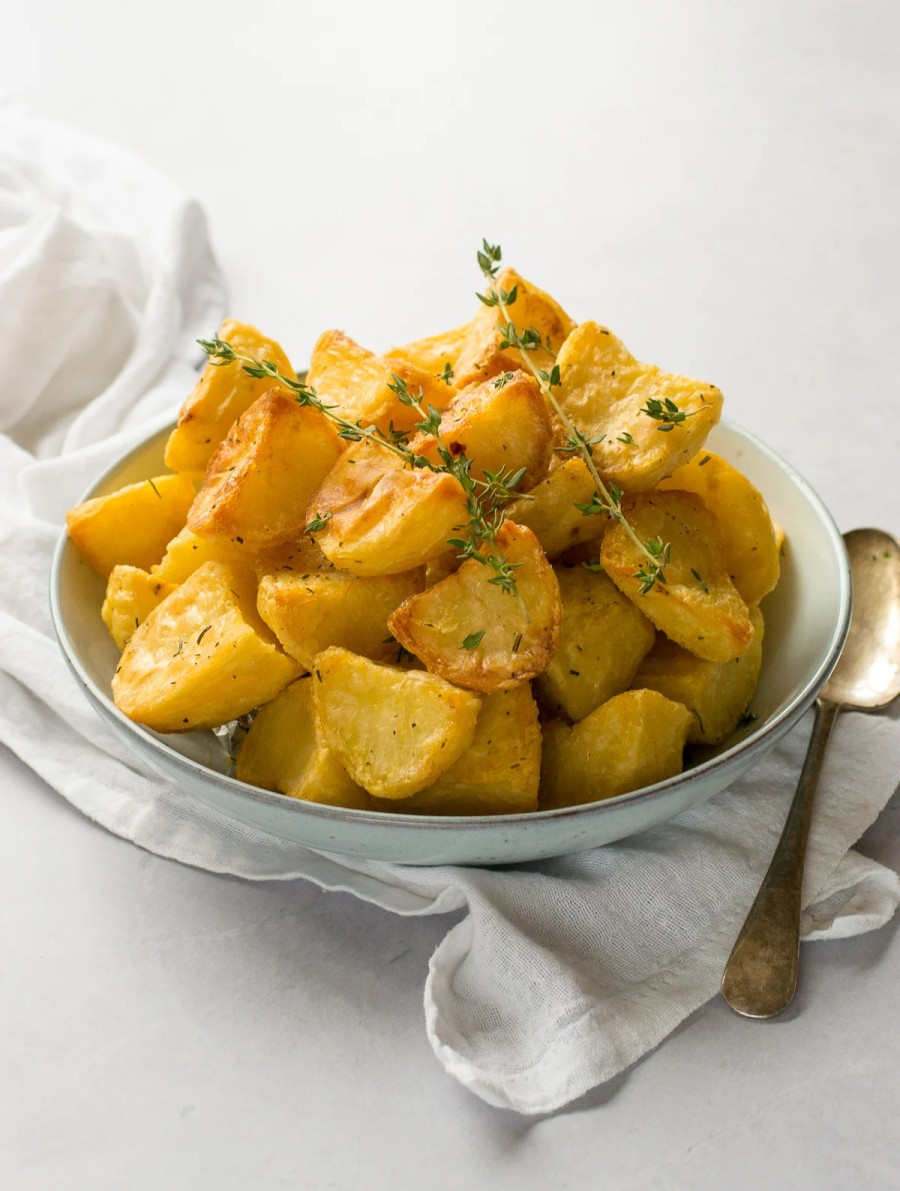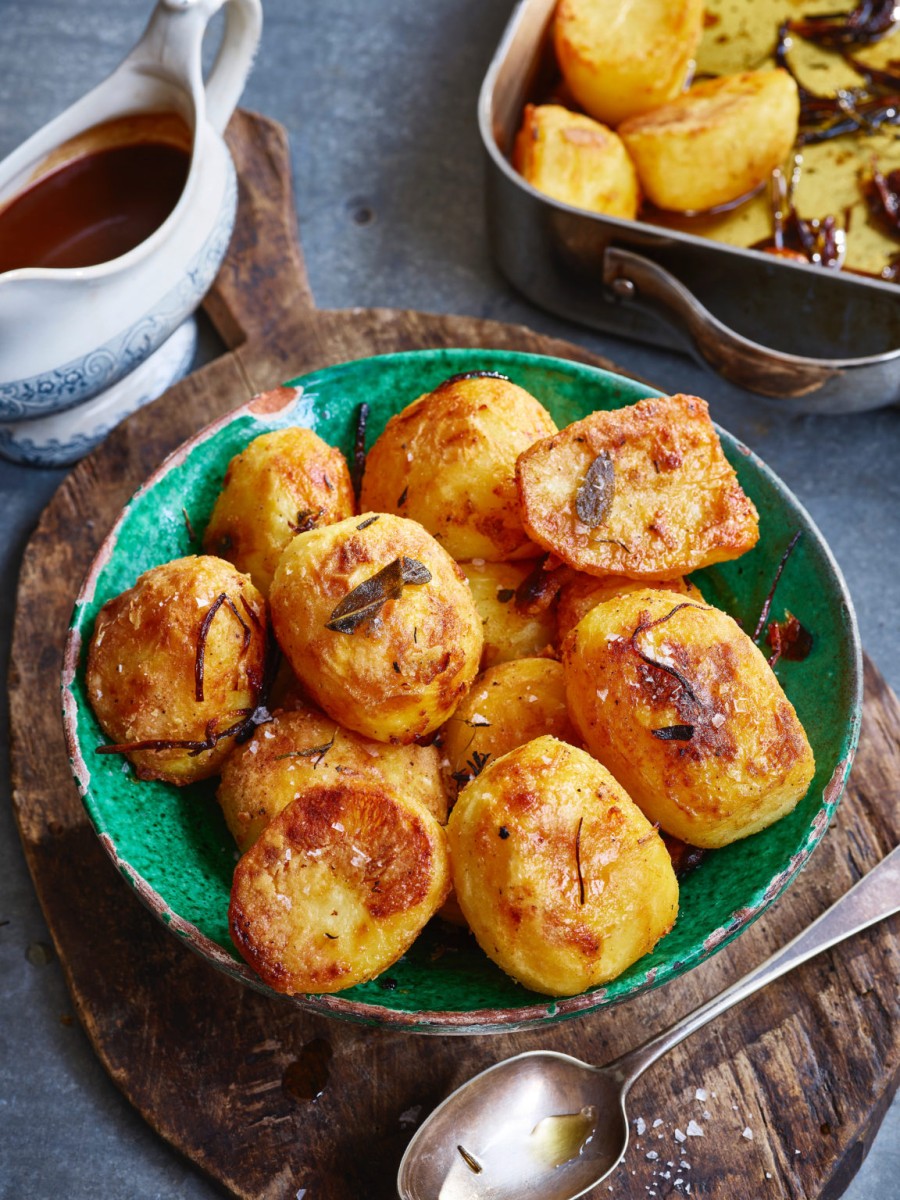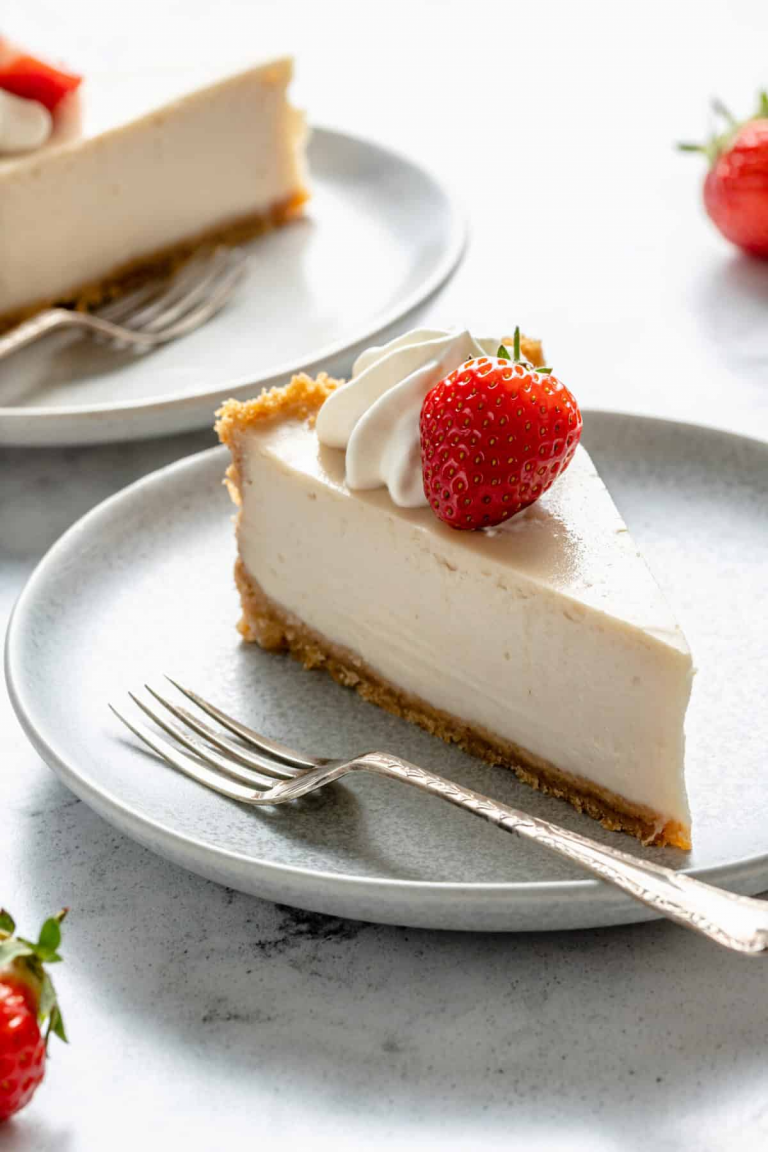
Nothing says Sunday lunch in England, quite like a tray of golden roast potatoes. They’re always piled high next to the main, soaking up all the best flavours from the rest of the meal. Traditionally, people reach for goose fat to get that crisp finish. But you don’t need animal fat to make proper tasty, crunchy spuds.
Plant-based options bring out the best in roast potatoes with just as much crunch and even more flavour, perfect for everyone (especially if you want to keep things kind for animals). Now, cooks and animal lovers alike can enjoy all the satisfaction of a classic roast, no goose needed. These vegan-friendly recipes let you keep the tradition—and the extra crispy edges—on your table, whatever the occasion.
Classic Roast Potatoes (So Vegan) use Maris Piper or Yukon Gold. Let them cool before adding to hot oil, to remove moisture keeps them crispy.
Don’t feed leftover roast potatoes to pets, due to choking hazards and salt (read up on food safety for people & pets.
Also due to salt, don’t give leftover roasties to garden birds or wildlife (fat also smears on feathers, affecting waterproofing & insulation).
For garlic roast potatoes, bin all allium scraps (along with citrus and rhubarb) as acid can harm compost creatures.
For small amounts of cooking oil, just wrap in paper towel and bin. For larger amounts, use a cooking oil recycling container, to empty at recycling banks.
More Simple Roast Potato Recipes

Roasted Garlic Thyme Potatoes (Broke Bank Vegan) use Yukon Gold, Russet, fingerling or new potatoes. Serve with vegan Parmesan (conventional Parmesan is not even vegetarian).

These garlic rosemary roast potatoes (The Veg Space) are super simple and tasty.

Try these roasties from Welsh chef Gaz Oakley.

These pan-roasted potatoes from Germany (Ela Vegan) are similar to Greek potatoes, where you chop them up and fry them in oil. In this case they are steamed after gentle frying, then seasoned and served with chopped herbs.
French-Style Vegan Dauphinoise Potatoes

This recipe for vegan Dauphinoise potatoes (The Veg Space) is something different.
The History and Tradition of Roast Potatoes
Roast potatoes have a special place at British tables, especially on Sundays and festive days like Christmas. Their perfect crunch and fluffy insides make them a treasure beside roasts, vegetables, and gravy. The story of roast potatoes is full of tradition and nostalgia, shaped by changing habits and shifting tastes over many generations.
A Classic Side at the Heart of British Meals
Roast potatoes didn’t just appear one day—cooks made them a fixture over centuries. From humble beginnings, potatoes became a vital part of British diets soon after their arrival from the Americas in the late 1500s.
By the 18th and 19th centuries, roast potatoes had made their way into the classic Sunday roast, a tradition loved across the country. Families would come together for a meal, with the roast surrounded by golden roasties, Yorkshire puddings, and seasonal veg.
During the Victorian era, the Sunday roast cemented itself as a cornerstone of English dining. People took pride in their potato skills, swapping tips for perfectly crisp results. Even the smallest details—like shaking the spuds in the pan to rough up the edges—became part of kitchen lore.
The Old Style (animal fats)
At Christmas, roast potatoes took on an even bigger role. No winter feast felt complete without them. Traditionally, people used animal fats to roast their spuds. Goose fat, in particular, became the gold standard for many homes. Its high smoke point and rich taste became popular, when geese were sadly widely eaten in Britain.
Besides goose fat, some families would reach for beef dripping or lard, depending on the roast sitting at the centre of the table.
Shifting Tastes: From Goose Fat to Plant-Based Options
Things have changed in recent years. While the nostalgia for fat-roasted potatoes remains, more people than ever choose plant-based diets. Some avoid animal fats for ethical reasons, some for health, and some for sustainability.
For many, switching to plant-based options means everyone can tuck in, no matter their diet. The humble spud brings people together, bridging old customs with new ideas. Whether you’re vegan, goose-friendly, or just after the loudest crunch, roast potatoes keep their status as the hero of every roast.
Choosing the Best Potatoes and Oils
To get that perfect roast potato—fluffy inside and shatteringly crisp outside—your choice of potato and oil matters as much as your roasting skills. The right combination lifts a simple spud to the centrepiece of any Sunday or festive meal. Let’s look at which potatoes and oils deliver the best results for a vegan, goose-friendly roast.
Picking the Right Potato: Fluffy Centres, Crunchy Crust
Different potatoes have different amounts of starch and moisture, and this affects how they cook. For roasties, you want a potato that crisps up on the outside but stays soft in the middle. Two types always stand out in kitchens:
- Maris Piper: These are the go-to for many home cooks. Their texture is dry and fluffy, which makes them perfect for roasting. They soak up flavours and give that light, crisp crust you want.
- King Edward: Another strong choice, King Edwards also roast beautifully. With their pale flesh and soft centres, they offer a classic taste that feels right for Sundays and Christmas dinner.
- Desiree: While not as common, Desiree potatoes roast up well. They have a slightly waxy texture but deliver great flavour and a lovely colour.
If you try to roast potatoes with high moisture, like new potatoes or most salad types, you’ll get a softer, less satisfying bite. For best results, stick with those tried-and-tested starchy varieties.
You don’t need animal fats to achieve roast potato glory. The oil you choose plays a key role in both flavour and crunch. A few straightforward options make your potatoes taste amazing while keeping every bite totally goose-friendly.
- Rapeseed Oil: This is a real winner. Rapeseed oil has a high smoke point, which means it can get seriously hot in the oven without burning. That level of heat is what turns roughed-up potato edges into golden shards of crunch. You’ll also find the flavour neutral, which lets your herby or garlicky touches shine.
- Sunflower Oil: Another good option. Like rapeseed, it has a high smoke point and mild taste. Sunflower oil is easy to find and works reliably for roasting.
- Olive Oil (light, not extra virgin): If you like a slightly richer taste, go for a light olive oil. Avoid extra virgin as it can burn quickly and may taste bitter once baked at high heat.
Not only do plant-based oils fry up potatoes just as well, but they’re also inclusive and diet-friendly for everyone at the table. There’s no flavour sacrifice—if anything, you’ll taste the potato more, not less.
Plant oils also support animal welfare and are usually lower in saturated fats, making them a friendlier swap. The oil coats rough potato edges and al
Classic Crispy Vegan Roast Potatoes
Let’s start with the basics. Good roast potatoes only need a few ingredients and the right steps. Maris Piper or King Edward potatoes with rapeseed oil work best for this version. Here’s how to make them golden and crunchy every time.
Ingredients:
- 1.5kg Maris Piper or King Edward potatoes
- 5–6 tbsp rapeseed oil
- Sea salt, to taste
- Freshly ground black pepper (optional)
Instructions:
- Prep the potatoes:
- Peel and cut potatoes into even chunks (about the size of a squash ball).
- Rinse under cold water until the water runs clear. This removes starch and keeps them from sticking.
- Soak in cold water for at least 30 minutes if you have time. This helps them crisp up.
- Parboil:
- Place the potatoes in a large pan, cover with cold, salted water and bring to the boil.
- Simmer gently for 7–8 minutes, just until the edges soften but the centres are still a bit firm.
- Rough up the edges:
- Drain thoroughly and return the potatoes to the empty pot.
- With the lid on, shake the pan hard for about 5–10 seconds. You want the outsides to look scuffed (not mashed). This gives you more surface for crisping.
- Heat the oil:
- Pour the rapeseed oil into a large roasting tray. Place in a 220°C (200°C fan) oven for about 5 minutes so it gets hot.
- Hot oil is key: it starts that golden crust as soon as potatoes touch it.
- Roast:
- Using tongs or a slotted spoon, gently lay potatoes into the hot tray. Toss carefully so each piece gets coated in oil.
- Sprinkle over plenty of sea salt for crunchy edges.
- Roast for 25 minutes, flip each piece, and roast for another 20–30 minutes, until deep gold with crisp outsides. Turn again if spots look pale.
- Serve:
- Serve your potatoes piping hot and scatter with extra salt if needed.
Key tips:
- Don’t overcrowd the tray—give each spud space to crisp.
- Hot oil is non-negotiable. It sets the crust right away.
- Parboiling plus shaking means extra crunch. Don’t skip these steps.
Herby Vegan Roast Potatoes
For a fresh spin, toss in herbs to bring your roast potatoes to life. Rosemary and thyme give a classic aroma, but you can use sage, oregano, or parsley if you want to shake things up.
Ingredients:
- 1.5kg Maris Piper or King Edward potatoes
- 5–6 tbsp rapeseed oil
- 2–3 sprigs fresh rosemary (leaves pulled off stems)
- 4–5 sprigs fresh thyme (leaves pulled off stems)
- Sea salt, to taste
- Black pepper, to taste
- Optional: 2–3 garlic cloves, smashed (skin left on)
Instructions:
- Prepare as for classic roast potatoes: Follow the same steps for soaking, peeling, chopping, and parboiling.
- Rough up and oil: Shake the potatoes in the pan to get those edges fluffy. Pour oil into your roasting tray and heat in the oven at 220°C (200°C fan) until shimmering.
- Add flavour:
- Tip potatoes into the hot oil. Quickly add rosemary and thyme leaves, tossing everything together.
- For a subtle garlic flavour, throw in whole smashed garlic cloves at this stage.
- Season well with salt and pepper.
- Roast:
- Roast for 25 minutes. Turn potatoes and stir the herbs so they don’t stick or burn (the herbs will crisp and scent the oil).
- Roast for another 20–30 minutes, checking and turning again if needed. Potatoes should be golden, the herbs crunchy.
- Adjust for taste:
- If you love herbs, sprinkle extra fresh ones over right at the end. For a milder flavour, stick with less.
- Add a pinch of smoked paprika or cracked pepper for extra character if you like.
Best times to add herbs:
- Rosemary and thyme (at end of roasting)
- Sage (midway through roasting)
- Parsley (tossed in at the end)
- Don’t add dried herbs (they burn too quickly)
Build on these ideas to find your favourite roast potato style. Whether you choose plain or pack in herbs, you’ll get roasties that are crisp outside, soft inside, and big on flavour—no animal fat needed.
Tips for Goose-Friendly Roast Potatoes
You only need a few smart tweaks to turn good roast potatoes into great ones. Small changes in prep, roasting, or storing can make a huge difference. Get ready for spuds that bring cheers at the table every time—without a drop of goose fat. Use these tips to keep your potatoes crisp outside and pillowy inside, whether it’s a family lunch or a festive feast.
Roast at the Right Temperature
Roasting at a high temperature gives you that all-important crunch. If your oven is too cool, the potatoes soak in oil and go soft or greasy. Set your oven at 220°C (200°C fan). This heat blasts moisture from the edges, resulting in the crunchiest finish. If your oven has hot spots, move the tray around halfway through to bake evenly.
Don’t Overcrowd the Tray
Give your potatoes space on the tray. If they touch, they’ll steam and turn soft, not crisp up. Spread them out in a single layer so every side gets hit by the hot oil and oven heat. For a big batch, use two trays instead of piling everything on one. Those gaps make all the difference.
Use Hot Oil from the Start
Heat your oil in the roasting tray before adding potatoes. This helps form that golden crust instantly. When you add them, you should hear a sizzle—if not, heat the tray a little longer. Coat each chunk well for the best finish.
Rough Up the Edges
After parboiling, give the potatoes a firm shake with the pot lid on. This step is more than tradition. The rough bits soak up hot oil and crisp the best. It transforms the texture so every bite shatters before giving way to the fluffy heart.
Salt for Crispness
Season the potatoes with salt just before roasting. Salt draws out surface moisture, encouraging crunch. You can always add more at the end if needed. Coarse sea salt gives the best result.
Make Some Room for Flavour
Once you’re happy with the basics, experiment with new flavours. Sprinkle over smoked paprika, nutritional yeast, or a dash of garlic powder. For extra depth, toss in lemon zest or swap in different herbs midway through roasting.
Try adding these:
- Crushed fennel seeds for a sweet, savoury note
- Black pepper and a pinch of chilli flakes for a gentle warmth
- Finely chopped coriander or parsley just before serving
Let your imagination guide you—there’s no wrong way if you enjoy the taste.
Store and Reheat Like a Pro
If by some miracle you have leftovers, store them right to keep their edge.
- Cool quickly: Transfer potatoes to a clean tray, letting them cool at room temperature. Avoid leaving them in the hot roasting tin or leftover oil.
- Fridge storage: Place in a sealed container and store in the fridge for up to two days.
- Revive in the oven: For reheating, spread the cold spuds on a tray and bake at 200°C for 10–15 minutes. Skip the microwave—it ruins their crunch.
- Freezer tip: You can freeze roast potatoes after cooking. Spread them on a lined tray to freeze for a few hours, then transfer to a bag or box. When ready to eat, bake straight from the freezer until piping hot and crisp (about 25 minutes).
Conclusion
Tucking into a plate of vegan roast potatoes is simple and satisfying. You get all the crunch and golden finish without using animal products, so everyone at the table can enjoy them with a clear conscience. These recipes keep things familiar yet kind, proving you don’t need goose fat for great flavour.
Give these goose-friendly roast potatoes a go next time you cook a Sunday roast or host a big gathering. Try your own tweaks or share your favourite spins using the comments below. Thanks for reading, and let’s keep making roasts that are good for every guest—geese included.






